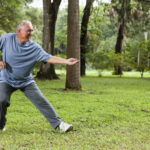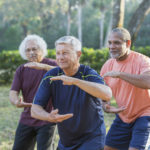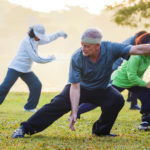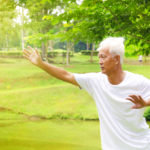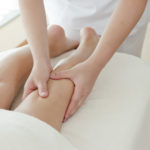Tai Chi
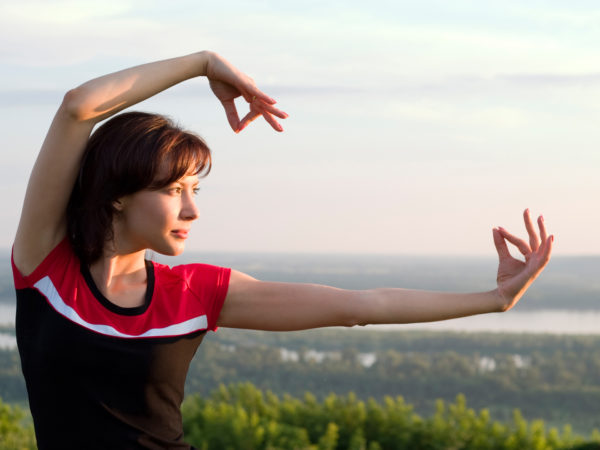
What is tai chi?
Sometimes called “Chinese shadow boxing,” tai chi is a gentle form of martial art and exercise that involves a formal series of flowing, graceful, slow-motion movements designed to harmonize the circulation of “chi” around the body. Chi, also rendered as ch’i or qi, is a term from Traditional Chinese Medicine (TCM) used to describe an energy flow that pervades the universe and sustains the living beings within it. It is a controversial concept in Western medicine, as chi has not thus far been detected via conventional laboratory techniques.
The term “tai chi” refers to the energy achieved by perfectly balancing yin with yang – held by TCM to be the two essential forces of the universe.
Regardless of whether one accepts TCM’s conceptual framework, tai chi can serve as a healthy form of low-impact exercise that can help to develop strength, balance and flexibility.
What can tai chi do for health maintenance and health conditions?
Tai chi is a healthy form of movement, especially for those with osteoarthritis or other musculoskeletal impairments. It can build core strength and improve lower limb musculature, as well as improving posture, balance, flexibility, and mobility. Tai chi can facilitate relaxation and focus even while executing the moves, and synchronizes the musculoskeletal and nervous systems. It helps to develop concentration and coordination, and can help reduce the risk of falls in the elderly. Because it promotes calming and relaxation, tai chi can be useful for conditions caused or worsened by stress and anxiety, such as hypertension, pain syndromes brought on by muscle tension and insomnia.
A study published in the August 19, 2010, issue of the New England Journal of Medicine suggested tai chi can be beneficial for relief of fibromyalgia, a condition characterized by chronic pain and fatigue. In addition, a recent review published in the July-August, 2010, issue of the American Journal of Health Promotion concluded that both tai chi and qigong (another movement-based TCM practice said to balance chi) were acceptable alternatives to traditional forms of exercise.
What should one expect on a visit to a practitioner of tai chi?
Since you will be moving your body, it is important to dress appropriately in clothing that allows freedom of movement. Tai chi typically starts with a five to 10 minute warm-up designed to center oneself, focus on breathing and awaken the flow of chi. The instructor will then take you through a series of movements – often with unique names like “Wild Goose Looks for Food” or “Stomping on the Tiger’s Tail” – most performed in continuous, circular motions, while focusing on breath and posture. These movements will often last 25-30 minutes, typically ending with a five to 10 minute cool-down.
Another way to practice tai chi is through video instruction. A variety of DVDs is available to access various tai chi and qigong methods, and a search for the term “tai chi” in Google’s video search yields 278,000 results. These can be helpful alternatives when one can’t find classes or trainers. Obviously, however, videos do not offer the kinds of hands-on application and management of proper form that an instructor might.
Are there any side effects or situations in which tai chi should be avoided?
Anyone with an existing health condition is well advised to consult their physician before beginning any exercise program. Having said that, tai chi is perhaps the lowest impact exercise in popular use. It is extremely gentle, can be done standing or sitting, and can be used even for those with relatively fragile constitutions if done carefully with minimal if any side effects.
Is there a governing body that oversees or credentials practitioners in tai chi?
The American Tai Chi and Qigong Association (ATCQA) offers a certification program. The ATCQU has a code of ethics and offers different levels of certification from practitioner to instructor, each with specific requirements for hours of study and practice, references, and continuing education to maintain qualifications.
How does one get in touch with a practitioner of tai chi?
The ATCQA has a tai chi classes locator, which allows the individual to enter location information, providing lists of tai chi practitioners in that area.
Are there other therapies that might work well in conjunction with tai chi?
Tai chi is often used within the system of TCM, where many different treatment modalities are used including acupuncture, Chinese medicinal herbs, and Chinese bodywork.
Craniosacral therapy and other forms of osteopathic or chiropractic manipulation along with other types of bodywork can also work seamlessly with a tai chi practice. Yoga and other forms of mindful movement can be utilized, as well as mind-body therapies and stress management strategies like breath work, guided imagery and visualization.
What is Dr. Weil’s opinion of tai chi?
The traditional martial art disciplines of China, Korea, and Japan have become very popular in the West. They emphasize agility, balance, and coordination in addition to fighting and defense. Some are much more aggressive than others (karate), and some regularly lead to injury (aikido). Of all of them, the only one that Dr. Weil recommends as part of a program of health maintenance is tai chi.
Dr. Weil believes that tai chi is a wonderful form of mental and physical stimulation, great for overall health. Like yoga, tai chi is a good method of stress reduction and relaxation, and it promotes flexibility, balance, and good body awareness. It is beautiful to watch and do, and may be particularly good for the elderly, because it reduces risk of injury from falls.
Learn more: Watch a video on how to enter the meditative state necessary for practicing tai chi.


